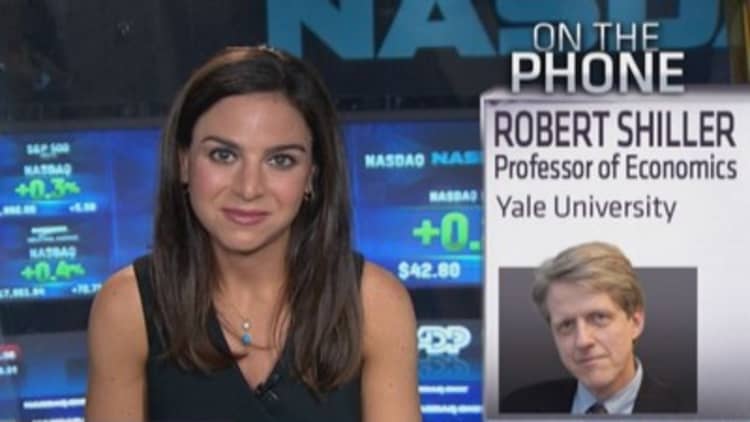
If everything's expensive, then what do you buy?
That's the riddle facing Yale economist Robert Shiller, who makes the case that both stocks and bonds look expensive now, and "bubbly thinking" abounds.
Read More'Everything is pricey': Robert Shiller
Shiller's advice is actually three-fold. First, find a proper asset balance for your portfolio. Second, use the strategies of "value investing" to pick the best stocks out there. Third, temper your expectations.
Equity valuations aren't justified, "but I would say that they're not outrageous yet. And given the alternatives, I think people still should have money in the market," Shiller said Thursday on CNBC's "Futures Now." "The lesson now is not to go overboard in the stock market, and also to have enough savings for your retirement, because the market overall is not likely overall to do as well as it has in the past."
When asked what sort of allocation percentages people might want to target, Shiller demurred.
"That's a difficult question! My first advice to most people would be, get a financial advisor. Because the answer to that question depends on your circumstances, your fears, your desire for a bequest to your children, whatever. And so there's no simple answer," Shiller said.
Read More Why Robert Shiller is 'dead wrong': Analyst
But for this Nobel laureate, the basic idea of asset diversification holds.
"I think that the general rule is, you do want to diversify across all the asset classes. Bonds and stocks look pricey, real estate is starting to get pricey. So, you know, you've got to put your money somewhere," he said.
And finally, Shiller says that even in an overpriced market, one can still find relative bargains.
"There's a time-honored principle called 'value investing.' It goes way back to Graham and Dodd in 1934 [when Benjamin Graham and David Dodd's landmark book, 'Security Analysis,' was first published]. And it still works, I believe. And that is to look among these major asset classes, look for lower price components."
Read More Jeremy Siegel: Bull market still intact
Of course, Shiller is known for his criticism of the "efficient market hypothesis," which states that market prices always reflect all available information, making beating the market impossible. Ironically, Shiller shared his 2013 Nobel Prize in Economics with (in addition to Lars Peter Hansen) University of Chicago professor Eugene Fama, who is famous for proposing that very theory.
—By CNBC's Alex Rosenberg.
Watch "Futures Now" Tuesdays & Thursdays 1 p.m. ET exclusively on FuturesNow.CNBC.com!



